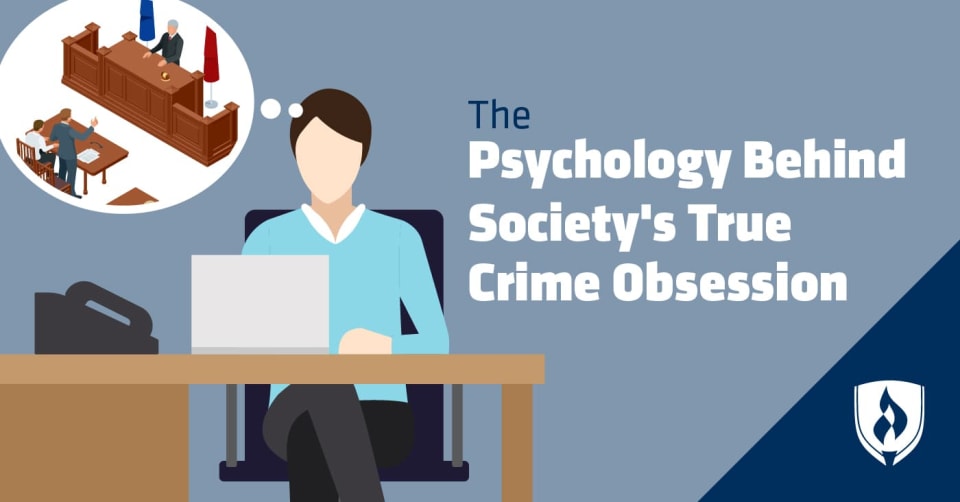From sneaking in a late-night episode of “Forensic Files“ or “Unsolved Mysteries“ as a kid to staying up-to-date with every true crime podcast title released by Wondery or the CBC as an adult, you’re not alone if your true crime obsession has been a longtime guilty pleasure

If you count yourself among the many who has binge-watched every true crime documentary you can get your hands on and you’re constantly on the hunt for a fascinating new true crime podcast, then you’ve probably asked yourself this pivotal question more than once: “Why are we so fascinated by true crime?”
It turns out that there are good reasons for this. Join us as we explore the inner workings of our collective true crime obsession by speaking with aficionados of the genre. From lawyers and criminology experts to true crime authors and podcast hosts, see what these pros have to say about the psychology behind this phenomenon.
4 Reasons we’re fascinated by “true crime” entertainment
While the true crime genre has exploded in popularity in recent years, it’s interesting to consider the fact that it’s not the aspect of crime in and of itself that draws people in. “It is important to note that people are only fascinated with certain aspects of true crime. The news doesn’t cover certain aspects of day-to-day criminal behavior,” explains criminal defense attorney Michael A. Dye.
Mainstream media, he says, typically covers the exceptions, not the rule. “I’ve been practicing criminal defense for approximately 15 years, and very few of my cases get any press coverage,” Dye adds. So, what is it that draws us in to some of the most tantalizing true crime stories—the ones that capture not only media attention, but the attention of tens of thousands of “armchair detectives” worldwide?
1. We’re curious about what drives people to do the unthinkable
At the forefront of our fascination with grisly crime stories is the eagerness many feel to try and understand what could motivate people to commit such heinous acts. “We all possess a dark side, although I would say most are light gray as opposed to inky black, and maybe that’s why so many of us are obsessed with the sinister doings of others,” offers Janice Holly Booth, author of “A Voice out of Nowhere: Inside the Mind of a Mass Murderer.”
She suggests our fascination with true crime stories may be representative of our curiosity about the inner workings of the mind. “For me, the fascination is not so much about what these broken people do as it is about why they do it. Deconstructing that mystery, getting to the very dark heart of their deeds, is what keeps [many] hopelessly captivated by true crime stories.”
Marc Lamber, attorney at Fennemore Craig, P.C., points to the fact that most people are regular, law-abiding citizens. “Because crime is foreign to most, the fascination with it and similar genres stems from the public’s curiosity regarding what would possess others to engage in criminal conduct, what it looks like and what happens as a consequence,” he explains.
Lamber likens it to a schoolyard fight that you simply can’t look away from. “Why does it draw such fascination? Maybe it’s the violence, maybe it’s the intrigue, maybe it’s the adrenaline it vicariously induces, or maybe all of the above. Most of all, though, I think it is [the] curiosity—a desire to understand that which is foreign to most of us,” he adds.
2. We want to preserve our belief in justice
When many of us put on our “armchair detective” hats, we’re prepared to pore over every detail of a case in hopes of cracking it wide open. This is, in part, due to the fact that our brains love puzzles and having problems to solve. But another aspect of this tendency is to see to it that the “bad guy” gets held accountable for his or her horrific actions.
Lindy Boustedt, producer and director at First Sight Productions and host of the podcast “A Senseless Death,” credits her desire to overcome the world’s general sense of chaos as a driving force in her interest in true crime. “True crime stories allow me to search for a sense of knowing, a sense of understanding so the world doesn’t feel so chaotic,” she says. “It also is a search for justice—hoping that in the end, the right side will prevail and justice will be served.”
3. We’re drawn to the adrenaline of fear
There are entire genres of fictional books, movies and TV shows devoted to evoking horror and fright out of readers and viewers. In many ways, true crime is no different. Professor of sociology and criminology Scott Bonn told Psychology Today, “The public is drawn to these stories because they trigger the most basic and powerful emotion in all of us: fear.”1
Bonn explained that while the actions of a serial killer may be horrible to behold, many people simply can’t look away due to the thrill of the spectacle. “As a source of popular-culture entertainment, serial killers allow us to experience fear and horror in a controlled environment, where the threat is exciting, but not real,” he said in his ¬≠Psychology Today write-up. “Serial killers are for adults what monster movies are for children—that is, good, ghoulish fun.”1
4. We’re driven by our own longing for survival
Dye agrees with Bonn’s notion: “It is kind of like the boogeyman. People want to know what is out there.” He posits, however, that rather than fear being a prime motivator, it may be something closer to a general longing for safety. “By watching, they feel that they are ‘in the know’ and that subconsciously makes them feel safe,” he says.
Our true crime experts are in agreement on this one. Emily Mendez, M.S., Ed.S., is a published writer and expert on the topics of psychology, criminology, deviant behavior and mental health. She suggests that our fear drives us to learn as much as we can to preserve our own safety.
“True crime appeals to our natural instinct to survive,” she says. “It eases our fears about the same thing happening to us. Understanding what the victims did or didn’t do in these situations helps us feel more in control. We believe that watching these shows will help us know how to act if we are ever in these situations ourselves.”
This may explain why women are often more likely to follow true crime stories than men.2 More often than not, the victims in the harrowing accounts chronicled by our favorite true crime outlets are women. Psychology professor Amanda Vicary told The Huffington Post, “In terms of preventing being the victim of a crime, women just have more to gain compared to men from listening to these podcasts and reading these books.”
Could you turn your true crime obsession into a career?
If you’ve been a devoted follower of the true crime genre for years, you may have found that you’ve become adept at spotting obscure clues or cultivating creative crime theories. What if you could take that coveted skill set and become more than just a third-party observer in these hard-to-solve cases?
Consider putting your sleuthing skills to use in an important investigative career. See whether you might have what it takes by visiting our article “Investigate Your Future: Are You Destined for a Crime-Solving Career?”
Related Articles:
- 8 Great Crime Museums Justice Studies Students Will Love
- 3 Supreme Court Decisions That Shaped Our Criminal Justice System
- 62 Criminal Justice Terms Law Enthusiasts Should Know
- Burglary vs. Robbery and 21 Other Common Crimes Defined
1Psychology Today, The Guilty Pleasure of True Crime TV, [accessed March 2019] https://www.psychologytoday.com/us/blog/wicked-deeds/201605/the-guilty-pleasure-true-crime-tv
2Vicary, A. M., & Chris Fraley, R. Captured by True Crime: Why Are Women Drawn to Tales of Rape, Murder, and Serial Killers?, Social Psychological and Personality Science, [accessed March 2019] https://journals.sagepub.com/doi/abs/10.1177/1948550609355486




